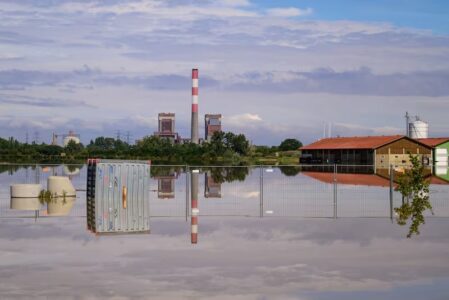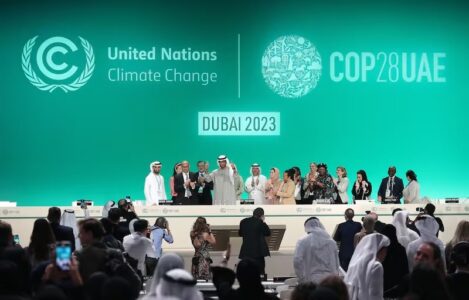The UAE’s climate summit had “inspired” the new British government, the UK’s Foreign Secretary David Lammy said, as he announced a major change of tack on climate change.
Taking a very different approach to the previous government, Mr Lammy has put the climate emergency at the top of his agenda.
He said the Tories had run a “fossil fuel government in a renewable era”, as he said that tackling the issue would become a key part of his work as head of the Foreign Office.
Earlier this year, a report by independent government advisers said Britain was not doing enough to meet targets and concluded it had “lost its clear global leadership position” on tackling the climate crisis. Mr Lammy said he was “determined to restore Britain’s reputation for commitment and innovation in the world of development finance”.
In a keynote speech he said the urgency to unlock international funding for the global south as well as warning of the worldwide impact of forced human migration from hot zones.
But he also cautioned that both Britain and the global north could not ignore the impact of climate change much longer, highlighting the prediction that by 2050 more than 200 million in the global south will be forced from their homes by temperature rises.
He said: “Demands for action from the world’s most vulnerable, and the requirements of delivering security to British citizens are fundamentally aligned … the threat may not feel as urgent as a terrorist or an imperialist autocrat, but it is more fundamental. It is systemic, it is pervasive and accelerating towards us at pace.”
The change of direction putting climate at the heart of government policy was crucial to making improvements to the global outlook, experts told The National.
“It’s really important that the UK has changed tack and it’s really good that we are back in a leadership, that we are now a voice to be heard,” said China Williams, senior science policy adviser at the Royal Botanical Gardens in Kew, London.

Her comments came a few minutes after Mr Lammy had travelled to Kew, which uniquely preserves two billion of the worlds seeds to avoid their extinction, making the unusual decision for a UK foreign secretary to speak on climate.
But his reasons were very clear. “There will be no global stability without climate stability,” he told the audience of global ambassadors, including Saudi Arabia, Brazil and India as well as UK Treasury officials.
Cop 28 Dubai inspiration
For Mr Lammy, whose father was a migrant from Guyana, the impact of global warming was “personal” after Storm Beryl became the earliest Category Five hurricane to ever hit the Caribbean in June.
“It’s the most vulnerable that bear the brunt,” he said, adding that how the world tackled the emergency will “define our time”.
This required a “hard-headed approach from diplomacy and finance” he said before referencing the progress made in the Cop 28 summit last year in Dubai.
“The agreement on loss and damage at the last Cop was an inspiring example of what the world can achieve by working together,” he said.

Ms Williams agreed that Cop 28 had been key with “the big decision on loss and damage” as well as opportunities for investing.
“Cop 28 really illustrated the damage on the ground to communities such as the Caribbean where people who do least damage suffer the most,” she said. “David Lammy made that very personal.”
Professor Mark Maslin, a leading London University climate change academic, said Cop 28 “drove the agenda” and even though Dubai was “in heart of the oil and gas producing world their plan for a just and orderly transition away from fossil fuels was huge”.
Movement of people
Prof Maslin, who personally briefed Mr Lammy on climate before the last election, said the politician took the issue “very, very seriously from an economic point of view as well as the threat to human life”.
“As foreign secretary he gets the global ramifications as climate change makes more parts of world uninhabitable then there will be a consequential movement of people that will have geopolitical implications affecting the balance of power around the world,” he added.
That is why the new Labour government is diverting significantly from the previous Conservative position on carbon emissions in which they U-turned on net zero by 2030.
He said: “They became climate dinosaurs – crashing offshore wind, blocking onshore wind, moving the goalposts on electric vehicle targets, doubling down on oil and gas, leaving British wildlife in crisis, our biodiversity declining at an unprecedented rate, our precious national parks in decline, our rivers, lakes and seas awash with toxic sewage. Blind (to) the opportunities of the energy transition, a fossil fuel government in a renewable age.”
The UK government further signalled its new stance after the Environment Secretary Ed Miliband made a climate speech a few hours earlier on Tuesday in which he stated the importance of renewable energy.
“Every wind turbine we put up, every solar panel we install, every piece of grid we construct protects families from future energy shocks,” he told the Energy UK conference.
He vowed to “take on the blockers, the delayers, the obstructionists” to build clean energy infrastructure.
Speaking at trade body Energy UK’s annual conference in London, he said the renewable energy transition is the “economic justice, energy security and national security fight of our time”.
He said switching to clean energy is not just about climate change, but that “dependence on fossil fuels leaves us deeply vulnerable as a country, and the Government’s view is that we simply can’t go on like this”.
Renewable age
Mr Lammy announced the creation of the global clean power alliance to improve renewable energy coverage worldwide.
He added that the Government would end the era of “do as I say, not as I do” climate diplomacy, and it would appoint a new UK special representative for climate change and nature.
The alliance would be focused on increasing global investment, Mr Lammy said, and widening the production and supply of minerals needed for batteries and green technology, including lithium, cobalt and copper.
Finance for global south
It was vital that countries came together to help finance the global south’s transition to clean energy, Mr Lammy said.
He wanted to instigate a “global clean power alliance” that would accelerate the clean energy transition. “Today we are firing the starting gun on forming this new coalition,” he said adding that it must “unlock global finance on a far larger scale”.
If this did not happen, then there would be mass migration from the south. “We cannot hope they will stay away from our shores,” he said but the threat “was coming towards us at pace”.
Getting energy to about 700 million people direct into their homes was “essential to help these countries lift themselves out of poverty” said Prof Maslin.
“Electricity allows children to study at night or start-up businesses that need to be connected to the national grid”, he added
Bernice Lee, the Chatham House think tank expert on climate, argued that the global south was “critical” not just for its mineral supply but because the emergency was an “existential threat” to all mankind.
“The needed scale and speed of transition requires a whole of economy, society and government approach beyond silos,” she added.
New leadership
Ultimately it was the UK’s new direction on climate change that could inspire others, said Ms Williams. “Our leaders are now going to Azerbaijan and of course to Cop 30 in Brazil next year which is showing true leadership,” she said. “This is a massive challenge but it says something that David Lammy really wanted to take it on.”
Her colleague Dr Paul Kersey, the deputy director of science at Kew, added that the new approach “puts nature at the heart of the government agenda”.
“I really like that Kew’s framing of the biodiversity and nature threat is permeating the highest levels of government,” he added



